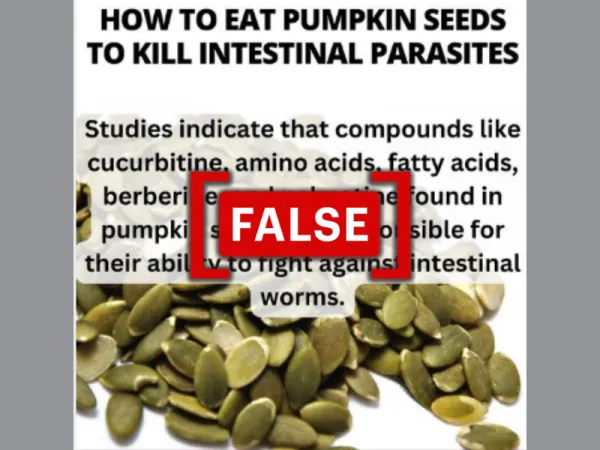By: Annet Preethi Furtado
October 17 2023
 Social media posts claiming that eating pumpkin seeds can kill parasites in humans. (Source: Facebook/Modified by Logically Facts)
Social media posts claiming that eating pumpkin seeds can kill parasites in humans. (Source: Facebook/Modified by Logically Facts)
Not enough human clinical trials have been conducted to establish pumpkin seeds' efficacy against parasites. Experts also consider them ineffective.
What's the claim?
A Facebook post going viral claims that pumpkin seeds kill parasites. The image in the post shows pumpkin seeds and carries text that reads: "HOW TO EAT PUMPKIN SEEDS TO KILL INTESTINAL PARASITES. Studies indicate that compounds like cucurbitine, amino acids, fatty acids, berberine, and palmatine found in pumpkin seeds are responsible for their ability to fight against intestinal worms." The archived Facebook post can be found here.
Similar claims were also shared on TikTok, with one TikTok post garnering approximately 23,000 likes.
Screenshots of viral posts on Facebook and TikTok. (Source: Facebook/TikTok/Screenshots/Modified by Logically facts)
The archived versions of the posts can be found here , here, and here.
Screenshot of a TikTok video. (Source: TikTok/Screenshot/Modified by Logically Facts)
However, the claim is false. Health experts told Logically Facts that pumpkin seeds are not an effective treatment for eliminating worms or parasites.
Limited scientific evidence
While some traditional and anecdotal remedies suggest using pumpkin seeds for expelling intestinal parasites, these claims lack support from human clinical studies.
In a 2016 research study titled, "Evaluation of Anthelmintic Activity and Composition of Pumpkin Seed Extracts—In Vitro and in Vivo Studies," scientists aimed to assess the ability of different extracts from pumpkin (Cucurbita pepo) seeds to combat parasitic worms. They focused on two types of worms known as nematodes: Caenorhabditis elegans and Heligmosoides bakeri. Their experiments showed that these extracts affected the survival and development of nematodes, suggesting that the extracts might have anti-parasitic properties. However, the in vivo portion of the study was conducted on mice, not on humans, to investigate the effects of pumpkin seed extracts on nematodes.
Thailand's Food and Drug Administration, the national regulatory body and competent authority responsible for registering, evaluating, and monitoring food and drug products in Thailand, unequivocally asserted in an article that the belief in pumpkin seeds as an effective deworming remedy lacks substantiated evidence from human studies.
Not enough data from humans, say experts
Dr. Sheldon Campbell, Associate Professor of Laboratory Medicine at Yale School of Medicine said, “While there’s an old paper showing pumpkinseed extract decreases egg excretion in a mouse model, but absolutely no human data. Not a fact.”
Speaking with Logically Facts, general physician Dr. Maunik Patel states, "There is no human clinical trial that has shown that pumpkin seeds are an effective treatment for parasites or worms. U.S. Pharmacopeia listed pumpkin seeds as an authorized treatment for parasite elimination from 1863 to 1936 since the Native Americans used it for urinary problems and intestinal issues as traditional folk medicine. However, this was not based on scientific evidence, such as trials in humans or animals." He added, ''Despite the false claim about the parasite cleanse, pumpkin seeds have nutritional value that can improve bowel and prostate health, improve sleep, and reduce cancer risk.''
Gastroenterologist Dr. Rakesh Patel dismissed claims linking potential antiparasitic properties to the presence of cucurbitin in pumpkin seeds. He stated, "This is a false claim because even if pumpkin seeds contain cucurbitin, they will not paralyze worms and parasites in the body to remove them." He added, ''While pumpkin seed and areca nut have good nutritional value, on their own they cannot be used as treatment for any illness, especially for infections that result from a worm or parasite. If you are suffering from this condition, it is best to seek medical advice as these treatments have no human clinical trial backing.''
The verdict
There are limited studies on pumpkin seed's efficacy against parasites, and not enough evidence from human clinical trials. Experts also consider pumpkin seeds ineffective for worm infections. Therefore, we have marked this claim as false.